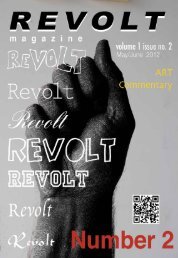Download PDF Version Revolt Magazine, Volume 1 Issue No.4
Download PDF Version Revolt Magazine, Volume 1 Issue No.4
Download PDF Version Revolt Magazine, Volume 1 Issue No.4
Create successful ePaper yourself
Turn your PDF publications into a flip-book with our unique Google optimized e-Paper software.
Christy Rupp, Flood Plane - Food Plan, detail, cut paper collage, 2010 16 X 24". Photo courtesy of the artist.<br />
resident who also hopes her state is a tougher<br />
target for the gas industry. “I got involved in the<br />
anti-fracking movement in 2008 when I first heard<br />
about it from a friend another potter, in our local<br />
supermarket,” said Jill. “I immediately thought,<br />
what a harebrained scheme, and that we -- New<br />
York -- were much too smart to fall for this.”<br />
Despite their energy and dedication these activists<br />
seem to be standing against Goliath. Volunteers<br />
from all walks of life, they speak and stand against<br />
the pricey PR machines of mega-corporations who,<br />
touting jobs and US sourced energy, play to the<br />
public’s hopes and fears in this age of uncertainty.<br />
Additionally, since CO2 emissions burning natural<br />
gas to generate electricity are about one half of<br />
what is produced when coal is used, gas can be<br />
seen as a solution to reduce environmental impact<br />
while solar and wind power are developed for<br />
widespread use. 1<br />
Why all the concern? The projected environmental<br />
ameliorations from extended gas drilling described<br />
above depend on price and profit considerations<br />
for the industry to be interested in making them<br />
a reality. Its willingness to voluntarily invest these<br />
profits in maintaining high standards is also<br />
necessary -- without it the potential collateral<br />
damage is far worse than that caused by coal. In<br />
other words, we would all need to trust the energy<br />
corporations to do the right thing.<br />
Already, there has been considerable consternation<br />
expressed by the scientific and local communities<br />
about the lack of disclosure by the industry of<br />
just what chemicals are being used. The refusal<br />
of those in control, including government and the<br />
courts, to allow Americans to determine whether or<br />
not the substances they are being exposed to are<br />
acceptable for them is most notoriously exemplified<br />
by the 2005 exemption for these corporations<br />
from the Safe Drinking Water Act, dubbed the<br />
“Halliburton Loophole.” 2<br />
Still another consideration is the toxic health<br />
hazard posed by radon gas, which is produced<br />
when natural gas is consumed. Radon, present in<br />
very high amounts in the Marcellus Sale deposits<br />
that the industry has slated for hydraulic fracturing,<br />
is carcinogenic and remains where the gas is burnt<br />
as fuel, degrading first into polonium, then lead.<br />
As communities experience effects of the<br />
practice, consequences such as tainted<br />
drinking water, illness in humans and animals,<br />
harassment of residents by drilling operation<br />
employees, radioactivity, and increased seismicity<br />
(earthquakes) have been reported. Potential<br />
environmental benefits are offset not only by<br />
present damage to the ecosystem from the drilling<br />
itself and the expansion of road traffic and water<br />
use that it demands, but also by the likelihood that<br />
a profitable boom in gas to fill today’s needs will<br />
only serve to delay investment in moving towards<br />
the truly carbon-free options that are essential to<br />
the health of the planet in the longer term.<br />
Where one might expect government regulators<br />
to intervene and demand that there is sound<br />
science behind the claims in favor of fracking<br />
andincreased use of natural gas, grassroots<br />
activists are picking up the slack. Ruth Hardinger<br />
and her friend Becca Smith decided to raise funds<br />
for a pipeline emission study in New York City.<br />
“Two reports on this study were just released to<br />
the press. These highly important studies, using<br />
the most advanced technology, present empirical<br />
evidence that current steps of continuing and<br />
increasing natural gas use would only accelerate<br />
climate change,” Ruth said. “In other words, if<br />
the US spends close to 1 trillion dollars in the<br />
development of natural gas as planned, the effects<br />
of climate change will only be accelerated.”<br />
While everyone involved in the movement has<br />
signed and distributed a seemingly endless stream<br />
of letters and petitions to governors, mayors, and<br />
agencies, one artist -- Jill Wiener -- took it upon<br />
herself to take the fight to the next level, running<br />
unsuccessfully for town council on the Democratic<br />
and Rural Heritage Party lines in 2011. In an<br />
interview at the time, she explained “I live in the<br />
country on 60 acres with a beautiful spring-fed<br />
pond. I’m a potter. I grow chemical-free flowers.<br />
I depend on my clean water for everything. It<br />
[fracking] is not proven to be safe, and I’d never<br />
inflict this on the land I call home or on my<br />
neighbors or community. We have people running<br />
for office all over the shale. [the Marcellus Shale<br />
is the geological formation rich in natural gas] I’m<br />
running for town council because my councilman<br />
supports it. I didn’t want to do this—I wanted to sit<br />
in my barn and make pots.” 3





